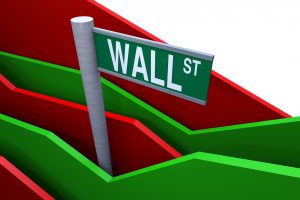Stocks fell to their lows of the day on Wednesday after President Donald Trump said U.S. tariffs on Chinese goods could stay on for a long period of time.
The Dow Jones Industrial Average declined 200 points, while the S&P 500 and Nasdaq Composite were both down 0.6 percent.
Trump also told reporters that tariffs on Chinese goods will not be lifted when a deal between the two countries is struck, but rather when China complies with the terms of that deal. Trump added, however, that a deal was coming along.

His comments come a day after Bloomberg News reported some U.S. officials are worried China could walk back on some concessions. However, The Wall Street Journal said U.S. Trade Representative Robert Lighthizer and Treasury Secretary Steven Mnuchin both plan to travel to Beijing next week for another round of negotiations with Chinese Vice Premier Liu He. These reports buffeted stocks on Tuesday.
China and the U.S. have been working on a deal for weeks and investors have priced in one being done. Stocks initially fell on Wednesday amid concerns over global growth while investors awaited a key Federal Reserve decision.
FedEx shares fell more than 5 percent after CFO Alan Graf warned in the company’s quarterly report that “slowing international macroeconomic conditions and weaker global trade growth trends continue, as seen in the year-over-year decline in our FedEx Express international revenue.”
That warning was followed by UBS CEO Sergio Ermotti saying this is one of the worst first-quarter environments ever as investment banking revenue falls about a third from the year-earlier period. Meanwhile, German auto maker BMW said its earnings could fall significantly in 2019 and added it will cut $13.6 billion in costs.
“We’re not out of the woods by any means,” said Christian Fromhertz, CEO of The Tribeca Trade Group. “These are things that continue to be bumps in the road with the equity market. You need the two things to happen: The Fed needs to stay dovish and you need a trade deal to eventually get done. You’re seeing that through FedEx and BMW.”
These negative comments come as the U.S. central bank is widely expected to keep rates steady later in the session, with investors monitoring a decision on the Fed’s rate projections for the next few years.
Stocks are up more than 12 percent this year in large part because the Fed said in January it would be “patient” in raising rates this year. However, Wall Street could be setting itself up for a letdown if the Fed does not indicate there will be no rate hikes this year as investors have priced in extremely favorable monetary policy conditions.
“The single most prominent bullish influence on stocks right now is the dovish Fed, and the run to fresh five-month highs in the S&P underscored its ability to single-handedly move the market,” Tom Essaye, founder of The Sevens Report, said in a note. “The new highs presented an opportunity to revisit the idea that while the Fed has the ability to drive stock prices higher like they currently are, they are also almost always the reason bull markets come to an end.”
